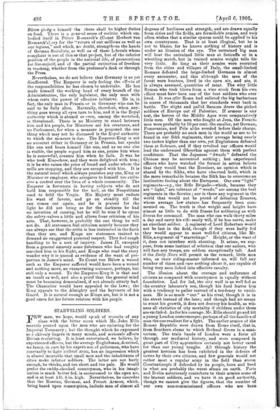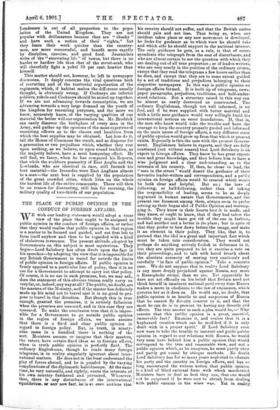STARVELING SOLDIERS. F EW men, we hope, would speak of recruits
of any class with the bitter scorn which Mr. John Ellis recently poured upon the men who are enlisting for the Imperial Yeomanry ; but the thought which he expressed so r. cklessly lingers in many minds, and seriously affects British recruiting. It is least entertained, we believe, by experienced officers, but the average Englishman, deceived, we fancy, in part by his experience of policemen, who have constantly to fight withoat arras, has an impression which is almost incurable that small men and the inhabitants of cities make inferior soldiers. The latter are not burly enough, he thinks, and too short and too pale. He would prefer the ruddy-cheeked countryman, who in his imagi- nation is much better fed, is accustomed to the open air, and is at least 5ft. 8 in. high. Nevertheless, he concedes that the Russian, German, and French Armies, which, being based upon conscription, include men of almost all degrees of burliness and strength, and are drawn equally from cities and the fields, are formidable armies, and very often wishes that a similar system could be applieno his own countrymen. That is at least illogical, but he is not to blame, for he knows nothing of history and is under an illusion of the eye. The untrained big man will beat the untrained little man at fisticuffs or in a wrestling match, but in trained armies weight tells for very little. So long as their armies were recruited from the cities and villages of Italy, the small-limbed Romans defeated the large-limbed Germans in almost every encounter, and this although the men of the forest were hunters, lived in the open air, and ate, it is always assumed, quantities of meat. The wiry little Roman who took blows from a vine stock from his own officer must have been one of the best soldiers who ever • lived. It was after Rome had enlisted the big barbarians in scores of thousands that her standards went back in battle. The slight and pallid Saracen drove the picked soldiers of Europe out of Palestine. If armour is any test, the heroes of the Middle Ages were comparatively little men. Of the men who fought at Jena, the French- men were probably by 10 per cent, the smaller, yet German, Pomeranian, and Pole alike receded before their charge. There are probably no such men in the world as are to be found in our Sikh regiments, their average being nearly two inches higher than our own, yet Englishmen defeated them at Subraon, and if they revolted our officers would lead the undersized Ghoorkas against them with perfect confidence. That the Japanese " dwarfs " defeated the Chinese may be accounted nothing ; but experienced officers who have watched the former in action believe that they would beat the Russians, an opinion which is shared by the Sikhs' who ha,ve observed both, which is the more remarkable because the Sikh has to overcome art instinctive feeling about the European. Our own "light" regiments—e.g., the Rifle Brigade—which, because they are " light," are tolerant of "weeds," are among the best regiments in the Service; • nor is there any regiment in the world that would not be proud of defeating ZouaveEi, whose average low stature has frequently been com- mented on. The truth is that weight and height have almost as little to do with fitness for soldiering as with fitness for command. The man who can walk thirty miles a day and carry his rifle easily will, if he has nerve, make an excellent soldier. A regiment of Lord Robertses would not be last in the field, though if they were badly fed they would appear to most well-fed citizens, like Mr. Ellis, a regiment of "starvelings." Height, or the want of it, does not interfere with shooting. It arises, we sup- pose, from some instinct of selection that our sailors, who will face any troops, are seldom exceptionally tall. And if the Daily News will permit us the remark, little men who, as their riding-master informed us, will fall any number of times and care nothing about it, are capable of being very soon licked into effective cavalry.
The illusion about the courage and endurance of citizens as compared with countrymen is equally without foundation. Lad for lad, the city waif is as well fed as the country labourer's son, though his food leaves him with a, tendency to pallor instead of a tendency to ruddi- ness. He is as much "out" as his rival, though it is in the street instead of the lane; and though bad air seems to stunt his growth, it does not destroy his health, as wit- ness all statistics of city mortality if children under three are excluded. As for his courage, Mr. Ellis should go and hit a young London costermonger, perhaps of all the families of man the one readiest for a fight.. The earlier armies of the Roman Republic were drawn from Rome itself, that is, from Southern alums to which Bethnal Green is a sana- torium. The train bands of London were a force all through our medieval history, and were composed in great part of City apprentices certainly not better cared for than our young roughs. All through history the greatest heroism has been exhibited in the defence of towns by their own citizens,.and few generals would not rather meet a regular array in the field than storm Constantinople if defended by its people, born and bred in what are probably the worst slums on earth. Paris and Berlin notoriously contribute to their armies some of the bravest soldiers, and we have it on good authority, though we cannot give the figures, that the number of our own non-commissioned officers who are born Londoners is out of all proportion to the popu- lation of the 'United Kingdom. They are not popular with drillmasters because they are "cheeky " and have such a notion of their "rights," but they learn their work quicker than the country- men, are more resourceful, and benefit more rapidly by discipline, exercise, and. good food. Journalists write of the "enervating life" of towns, but there is no harder or hardier life than that of the street-arab, who will cheerfully fight a yokel 50 per cent. heavier than himself.
This matter should not, however, be left to newspaper discuesion. It deeply concerns the vital questions both of recruiting and of the territorial organisation of the regiments, which, if habitat makes the difference usually thought, is obviously wrong. If Cockneys are inferior soldiers, yokels and Cockneys should be mixed up together. If. we are not advancing towards conscription, we are advancing towards a very large demand on the youth of the kingdom for recruiting purposes, and the more we know, accurately know, of the varying qualities of our material the better will our organisation be. Mr. Brodrick can easily discover the birthplace of every man in the Army, and gather up the opinions of the most experienced recruiting officers as to the classes and localities from which the best supplies may be obtained. Let him do it, tell the House of Commons the result, and so disperse for a generation or two prejudices which, whether they rest upon nothing, as we believe, or upon sound tradition, as the majority believe, have a most hampering effect. He will find, we fancy, when he has compared his Reports, that while the stubborn peasantry of East Anglia and the Lowlands, who are identical in race, still furnish his best material—the Ironsides were East Anglians almost to a man—the next beat is supplied by the population of the great crowded cities, which lives on the whole the hardest life of the entire community. There will then be no reason for distrustina, still less for scorning, the military quality of two-third; of our population.







































 Previous page
Previous page